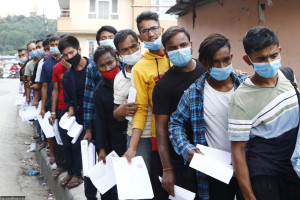Money
Heightened security hits Nepal-India trade
Indian border security personnel have put a damper on Nepal’s cross-border trade with India once again, as they have started conducting thorough checks of cargo vehicles entering India via the border point in the western Nepali city of Bhairahawa.
Madhav Dhungana
Indian border security personnel have put a damper on Nepal’s cross-border trade with India once again, as they have started conducting thorough checks of cargo vehicles entering India via the border point in the western Nepali city of Bhairahawa.
Officials of India’s Sashastra Seema Bal (SSB) these days spend almost 30 minutes checking each cargo truck that crosses Nepali territory. This has been going on for around a week. Earlier, these security checks used to be over in three to four minutes.
The exact reason for heightened security measures is not known, as Indian security officials have said they are only following “orders from the higher authority”.
This move has, however, hit Nepal’s exports and imports to and from India, created queue of cargo vehicles that stretches around five kilometers at the border point, and affected revenue collection at the Customs Office in Bhairahawa.
Indian border security personnel had resorted to similar measure around three weeks ago, hitting Nepal’s trade with India. But security checks were loosened after Nepali authorities held discussions with Indian officials. “Following this, Nepal’s trade with India from this border point had normalised,” Bhupal Raj Shakya, chief of Bhairahawa Customs Office, said. “But the recent tightening up of security has once again affected Nepal’s imports and exports.”
He, however, said talks were being held with the Indian side to conduct security checks in a manner that would not affect cross-border trade. Around a week ago, during a meeting attended by Nepali ambassador to India, Indian ambassador to Nepal, SSB deputy inspector general, high-ranking officials of Nepali security agencies, and representatives of Nepali and Indian chambers of commerce, Indian security personnel had agreed to conduct security checks without hampering Nepal’s exports and imports to and from India. The meeting was held at Behliya in Bhairahawa.
But security was tightened within days of holding the meeting.
If this continues, revenue collection from Bhairahawa Customs Office will take a dip, according to Shakya.
The office must generate revenue of Rs180 million to Rs200 million per day to meet its revenue collection target for this fiscal year.
“During normal days, we used to collect Rs230 million in revenue per day,” Shakya said. “But after the security measures were heightened, revenue collection has fallen to Rs120 million to Rs130 million.”
Although Indian security personnel hold the right to carry out operations to protect their country, what is surprising is that the SSB has heightened security only along the border point in Bhairahawa. Nepal shares 1,751-km open border with India. But this kind of security operation has not been reported at other border points.
“We are holding talks with concerned authorities to normalise the situation,” Chief District Officer of Rupandehi Binod Prakash Singh said. Indian Embassy Spokesperson Ruby Jaspreet Sharma did not respond to the Post’s text request for comments.




 20.51°C Kathmandu
20.51°C Kathmandu













